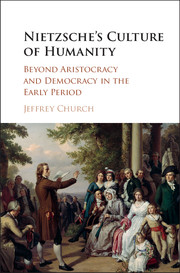Book contents
Preface
Published online by Cambridge University Press: 05 October 2015
Summary
A newcomer to Nietzsche scholarship is likely puzzled by the vastly different political positions attributed to him. Is Nietzsche a “radical aristocrat,” defender of a natural rank ordering of political society, advocate of an educational project of discipline and breeding, a hero worship of Caesar and Napoleon? Or is Nietzsche an “agonistic democrat,” critic of inherited values and practices who envisioned politics as the site of contestation about cultural norms and identities? Or is he antipolitical? Or simply confused? The scholarly debate over Nietzsche's politics has lasted for several decades and shows no sign of resolution. I wrote this book not to fuel the debate further, but to begin to move past it.
In what follows, I argue that each side of the debate captures a truth about Nietzsche's politics, but only a part of the truth. We can overcome the debate by showing how a fuller picture of Nietzsche incorporates these partial truths into a whole. In my view, Nietzsche is neither an aristocrat nor a democrat, but a “meritocrat.” According to this meritocratic interpretation, Nietzsche sees human excellence as the goal of politics and culture like the aristocrat. However, he rejects the aristocratic view of a natural rank ordering of human beings and the view that politics is for the personal good of a few. Instead, he adheres to the democratic claims that all human beings are capable of achieving human excellence and that community is for the good of all. This meritocratic view is most clearly illustrated in Nietzsche's early design of educational institutions. Like the democrat, Nietzsche advocates a universal public education for all students up to age fifteen, and, like the aristocrat, he then supports university study only for the highest achieving students.
This meritocratic reading explains why interpreters have been divided over Nietzsche's politics – as each side correctly grasps and champions part of the truth – and also gives us a fuller picture of Nietzsche's politics. What emerges from this book is a more sophisticated Nietzschean view of culture and politics than the “aristocratic” and “democratic” readings offer, because on this view Nietzsche seeks to incorporate both cultural and political tendencies in complex and dynamic ways.
- Type
- Chapter
- Information
- Nietzsche's Culture of HumanityBeyond Aristocracy and Democracy in the Early Period, pp. ix - xiiPublisher: Cambridge University PressPrint publication year: 2015



